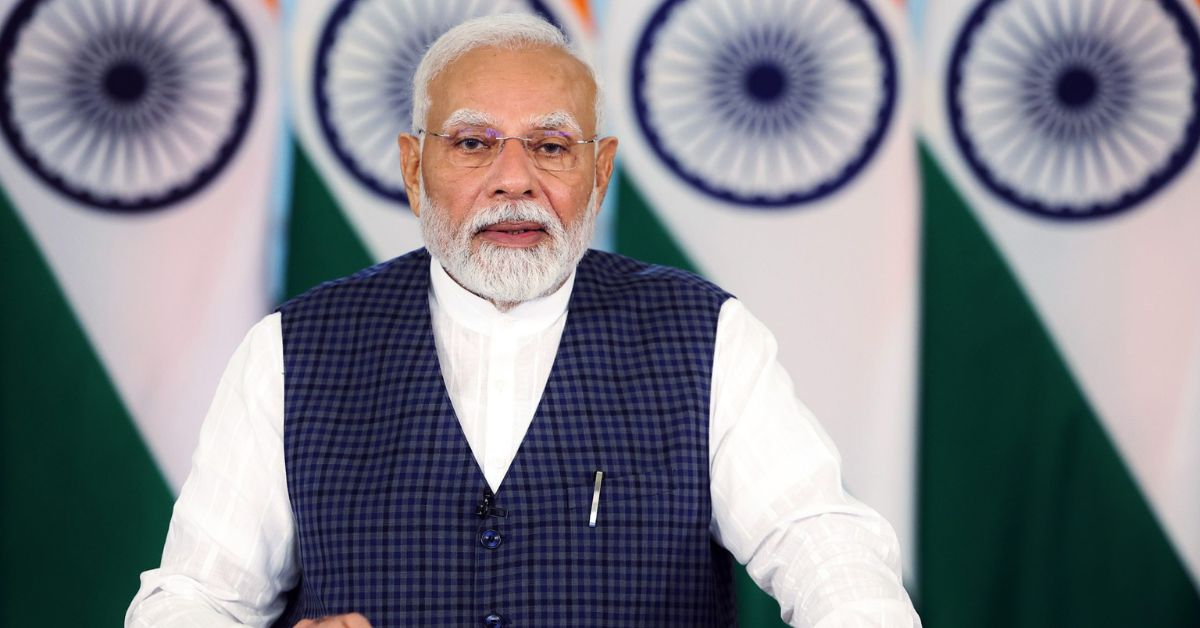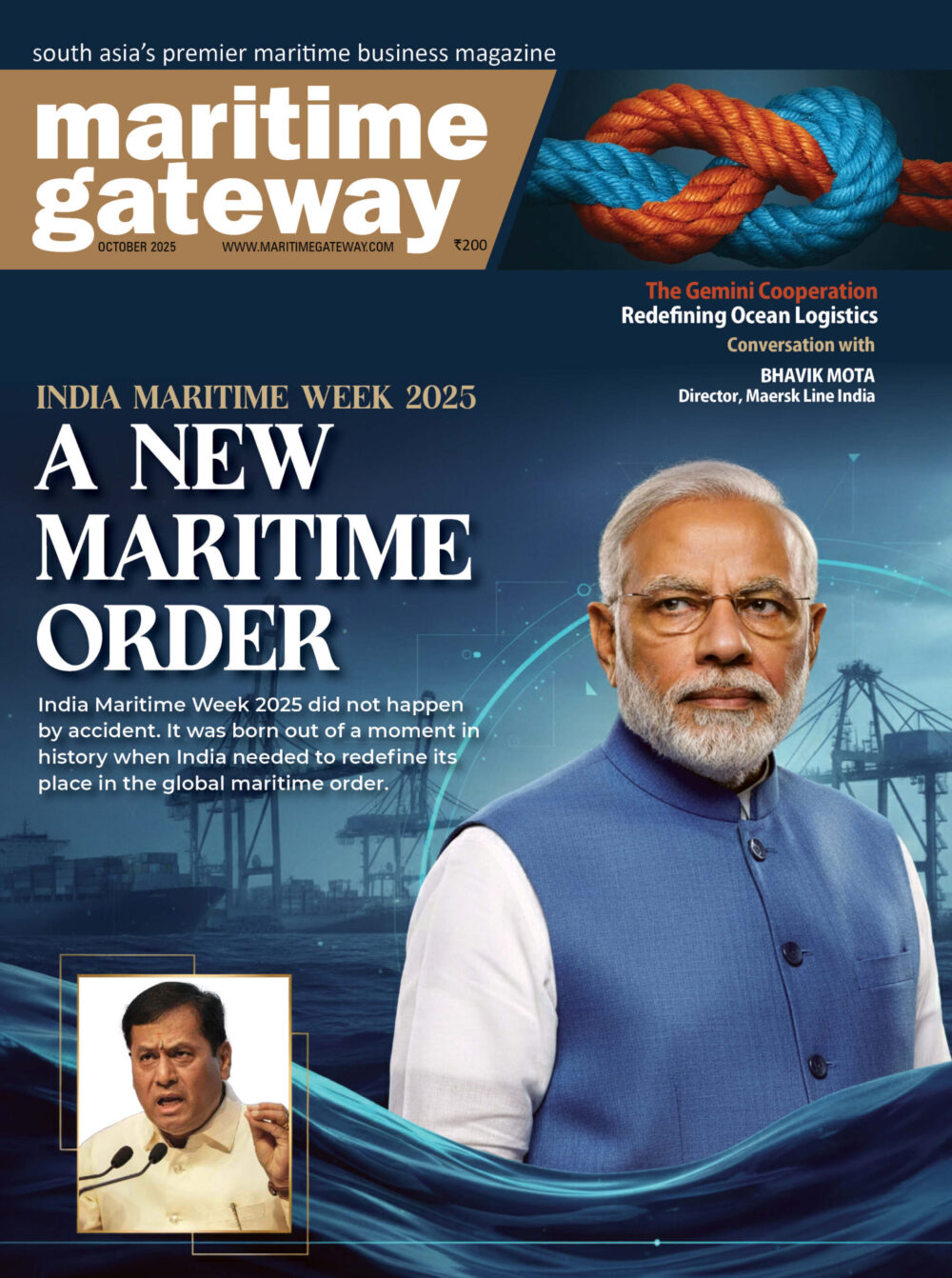Prime Minister Narendra Modi addressed the Maritime Leaders’ Conclave during India Maritime Week 2025 in Mumbai, Maharashtra, and chaired the Global Maritime CEO Forum. In his address, the Prime Minister lauded Gujarat’s Kandla Port, calling it the pride of the country.
He said that, for the first time, an Indian port has set up a megawatt-scale indigenous green hydrogen facility – and Kandla Port has achieved this remarkable milestone. It is worth mentioning that during his recent visit to Kutch, the foundation stone of a 10 MW green hydrogen plant was laid, out of which a 1 MW unit has already been commissioned. In a very short span, Kandla Port successfully set up the country’s first Make-in-India-based 1 MW green hydrogen plant, ushering in a new era for India’s port sector.
Earlier, the Prime Minister had also praised this initiative of DPA in a post on X, saying, “This is a commendable effort that strengthens sustainable development and advances India’s Net Zero vision.” This plant will play a significant role in supporting India’s mission to reduce carbon emissions.
The new facility is the first time in the country that such a futuristic initiative has been taken up by the Government of India port, laying the foundation for transformation in the maritime sector. It is a living example of Aatmanirbhar Bharat, with Gujarat once again playing a leading role in the nation’s development journey.
This achievement of Deendayal Port Authority, Kandla, has not only brought great pride to Gujarat but also to the entire country. Under the visionary leadership and guidance of Prime Minister Narendra Modi, Deendayal Port Authority Kandla, is achieving continuous progress, under the leadership of Sushil Kumar Singh, Chairman, DPA, Kandla.
Noting that several projects related to the shipping sector have been launched at the conclave, Shri Modi highlighted that Memorandums of Understanding worth lakhs of crores of rupees have also been signed in the shipping sector. The Prime Minister remarked that this reflects the global confidence in India’s maritime capabilities, adding that the presence of participants at the event stands as a symbol of their common commitment.
Prime Minister stated that this year, India has taken major steps towards next-generation reforms in the maritime sector. “The colonial shipping laws, over a century old, have been replaced with modern and futuristic legislation suited for the 21st century”, said the Prime Minister, remarking that these new laws empower State Maritime Boards, strengthen safety and sustainability, and expand digitization in port management.
Further noting that under the Merchant Shipping Act, Indian laws have been globally aligned with international conventions, Shri Modi said, this alignment has enhanced trust in safety standards, improved ease of doing business, and reduced government intervention. He expressed confidence that these efforts will further boost the confidence of stakeholders and investors.
Prime Minister stated that the Coastal Shipping Act has been designed to simplify trade and strengthen supply chain security. He emphasized that the Act ensures balanced development along India’s extensive coastline. Highlighting the One Nation, One Port Process, which will standardize port-related procedures and significantly reduce documentation requirements, Modi remarked that these reforms in the shipping sector are a continuation of India’s decade-long reform journey. Reflecting on the past ten to eleven years, he noted that the transformation in India’s maritime sector has been historic. Under the Maritime India Vision, more than 150 new initiatives have been launched, resulting in nearly doubling the capacity of major ports, substantial reduction in turnaround time, and a new momentum in cruise tourism. The Prime Minister added that cargo movement on inland waterways has increased by over 700 percent, with the number of operational waterways rising from three to thirty-two. He further stated that the net annual surplus of Indian ports has increased ninefold over the past decade.
“India’s ports are now counted among the most efficient in the developing world, and in many cases, are outperforming ports in the developed world”, exclaimed the Prime Minister. He shared key performance statistics, noting that the average container dwell time in India has reduced to less than three days, which is better than several developed nations. He highlighted that the average vessel turnaround time has dropped from ninety-six hours to just forty-eight hours, making Indian ports more competitive and attractive for global shipping lines. Modi added that India has shown significant improvement in the World Bank’s Logistics Performance Index. He further emphasized India’s growing strength in maritime human resources, stating that the number of Indian seafarers has increased from 1.25 lakh to over 3 lakh in the past decade. Today, India ranks among the top three countries globally in terms of seafarer numbers.
Remarking that a quarter of the 21st century has passed, and the next 25 years are even more critical, Modi emphasized that India’s focus is on the Blue Economy and Sustainable Coastal Development. He highlighted the government’s strong emphasis on green logistics, port connectivity, and coastal industrial clusters.
“Shipbuilding is now among India’s top priorities”, underscored the Prime Minister. Recalling India’s historical prominence in shipbuilding, he noted that the country was once a major global center in this field. He pointed out that not far from the venue lie the Ajanta Caves, where a Sixth Century painting depicts the design of a three-masted ship. The Prime Minister remarked that this design, seen in ancient Indian art, was adopted by other countries centuries later.
Underlining that ships built in India were once a vital part of global trade, Modi noted that India later advanced in the ship-breaking sector and is now accelerating efforts to reach new heights in ship-making. He mentioned that India has granted infrastructure asset status to large ships, a policy decision that will open new avenues for all shipbuilders present at the event. He highlighted that this will provide new financing options, reduce interest costs, and ease access to credit. To propel this reform, the Prime Minister declared that the government will invest nearly ₹70,000 crore. This investment will enhance domestic capacity, promote long-term financing, support the development of greenfield and brownfield shipyards, build advanced maritime skills, and generate millions of jobs for youth. He added that this initiative will also unlock new investment opportunities for all stakeholders.
Prime Minister remarked that the land hosting the conclave is the land of Chhatrapati Shivaji Maharaj, who not only laid the foundation of maritime security but also asserted Indian strength across the trade routes of the Arabian Sea. He highlighted Shivaji Maharaj’s vision that the seas are not boundaries but gateways to opportunity, and stated that India is moving forward with the same thinking.
Emphasising India’s commitment to strengthening global supply chain resilience and noting that the country is actively building world-class mega ports, Shri Modi announced that a new port is being constructed in Vadhavan, Maharashtra at a cost of ₹76,000 crore. He added that India is working to quadruple the capacity of its major ports and increase its share in containerized cargo. The Prime Minister affirmed that all stakeholders present are key partners in achieving these goals and welcomed their ideas, innovations, and investments. He reiterated that India permits 100 percent FDI in ports and shipping, and that public-private partnerships are rapidly expanding. Under the “Make In India, Make For The World” vision, incentives are being provided, and states are being encouraged to attract investments. He urged investors from various countries to seize this moment to engage and expand in India’s shipping sector, stating that this is the right time.
Underlining India’s vibrant democracy and reliability as a defining strength, the Prime Minister remarked, “when the global seas are rough, the world looks for a steady lighthouse, India is well poised to play that role with strength and stability”. Amid global tensions, trade disruptions, and shifting supply chains, Shri Modi stated that India stands as a symbol of strategic autonomy, peace, and inclusive growth. He emphasized that India’s maritime and trade initiatives are integral to this broader vision. Citing the India–Middle East–Europe Economic Corridor as an example, he noted that it will redefine trade routes and promote clean energy and smart logistics.
Emphasising India’s focus on inclusive maritime development, the Prime Minister stated that this goal can only be achieved by empowering Small Island Developing States and Least Developed Countries through technology, training, and infrastructure. He highlighted the need for collective action to address climate change, supply chain disruptions, economic uncertainty, and maritime security. Modi called upon all participants to move together towards peace, progress, and prosperity, and to build a sustainable future. Concluding his address, the Prime Minister extended his warm greetings and appreciation to all attendees for being part of the summit.
The Governor of Maharashtra, Acharya Devvrat, Chief Minister of Maharashtra, Devendra Fadnavis, Union Ministers, Sarbananda Sonowal, Shantanu Thakur & Kirti Vardhan Singh were present among other dignitaries at the event.
The Global Maritime CEO Forum, the flagship event of India Maritime Week 2025, brings together CEOs of global maritime companies, major investors, policy-makers, innovators, and international partners to deliberate on the future of the global maritime ecosystem. The Forum will serve as a key platform for dialogue on sustainable maritime growth, resilient supply chains, green shipping, and inclusive blue economy strategies.
The Prime Minister’s participation reflects his deep commitment to an ambitious, future-oriented maritime transformation, aligned with the Maritime Amrit Kaal Vision 2047. This long-term vision, built on four strategic pillars — port-led development, shipping and shipbuilding, seamless logistics, and maritime skill-building — aims to position India among the world’s leading maritime powers. India Maritime Week 2025 serves as the Government of India’s premier global platform to translate this vision into action, bringing together leading stakeholders across shipping, ports, shipbuilding, cruise tourism, and blue economy finance.









